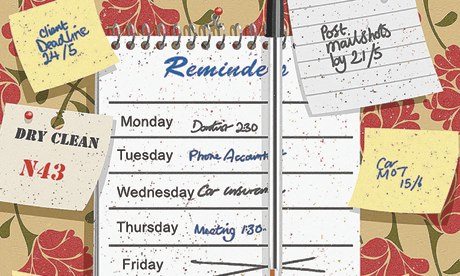
Nobody likes being too busy – that's why it's called "too busy" – but the human mind has all sorts of frustrating eccentricities that conspire to keep us that way, no matter what remedies we try.
To begin with, there's Hofstadter's law, bemoaned in a previous column: "It always takes longer than you expect, even when you take into account Hofstadter's law." Plan on completing a project in three days, and it'll take six; but reschedule to allow for five, and it'll take eight. There's Parkinson's law: work expands to fill the time available. Then there's the fact that being too busy is self-reinforcing: as the recent book Scarcity explains, lacking slack – whether of time or money – depletes cognitive bandwidth, prompting poor decisions, which dig us ever deeper. And let's not get started on the dubious psychological payoffs we derive from all this activity, which act as an incentive to stay overwhelmed. "Busyness serves as a kind of existential reassurance, a hedge against emptiness," as the essayist Tim Kreider puts it. "Obviously your life cannot possibly be silly or trivial or meaningless if you are so busy, completely booked, in demand every hour of the day."
It's all very frustrating. So when I encountered what seemed to be a ridiculously simple idea for reinserting slack into my schedule, I was naturally (if sceptically) intrigued. It came from Laura Vanderkam, who writes about work and time use, and it's this: Vanderkam doesn't schedule any work on Fridays. I don't mean she takes Fridays off. She just pretends, for planning purposes, that Fridays don't exist. That way, when projects inevitably overrun, and unexpected tasks rear up, there's a bucket into which the overspill can flow. The usual caveat applies: time tips from writers tend to reflect the working conditions of writers. Not everyone can just choose to arrange no meetings one day per week. But the principle still holds for whatever portions of time you do control, whether at work, in your social life, your children's lives, etcetera. If you frequently find yourself wishing there were more hours in the day, or more days in the week, try proceeding as if there were fewer.
Thus far, a few weeks into an unscientific one-person test, I'm impressed. I work as hard on Fridays as I ever did. But by day's end, I've largely completed my planned week's work, rather than feeling as if I'm barely two-thirds through. That's the real difference: a new sense of spaciousness, even if I'm not actually doing less. ("Having slack in your schedule is the equivalent of being a millionaire in the grocery store," Vanderkam writes.) Too many otherwise excellent strategies for dealing with overwhelm – such as taking naps or walks, meditating and so on – fail to become habits, I suspect, because they constitute yet more stuff to do: you've got to find time for the nap and the walk as well as the work. It's a problem Vanderkam's trick elegantly avoids.
It probably won't last. I imagine Hofstadter's law will reassert itself soon, as I subconsciously adapt to the new spaciousness of my schedule, taking on more tasks to compensate, until I'm as stressed out as before. But these schemes for introducing a bit more calm to daily life aren't valid only if they work for ever. For now, I feel as if I've discovered a minor loophole in the fabric of time itself. Deal with it, Stephen Hawking.
oliver.burkeman@theguardian.com
Follow Oliver on Twitter

